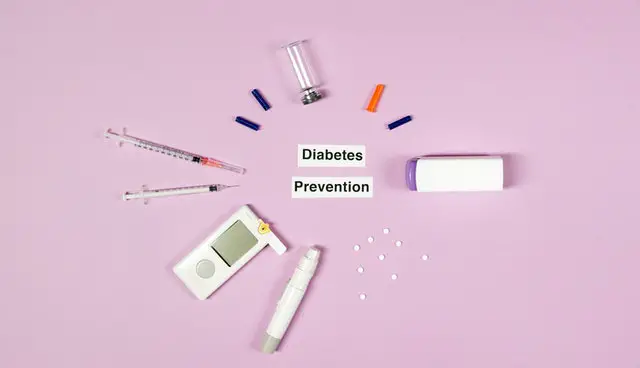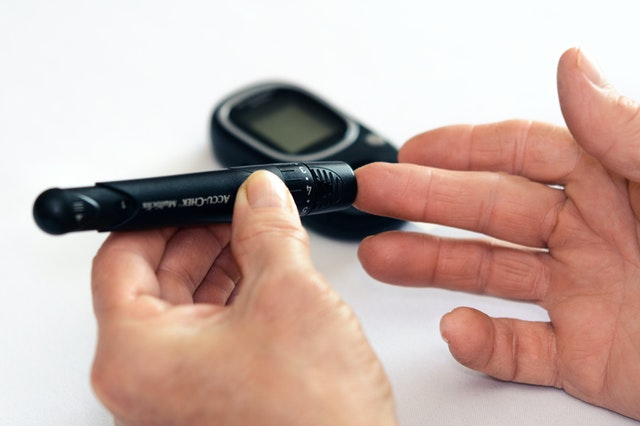Welcome to this month’s Health Corner! According to the CDC, 34.2 million Americans suffer from diabetes. That is about 1 out 10 people. Even more people are considered prediabetic – 88 million or 1 in 3. Diabetes can be very dangerous to one’s health but it is manageable. For some, it is actually avoidable altogether. What should you know about diabetes? Can you prevent it? If you have diabetes, how can you manage it effectively? What resources are available to you if you find yourself in need?
What is Diabetes?
Diabetes is a disorder where your body either cannot make insulin or cannot use the insulin your body creates. Insulin, which is created in your pancreas, takes the sugar (or glucose) out of your bloodstream and into your cells to be used for energy. So when there isn’t enough insulin or your body is unable to use it, the sugar remains in your bloodstream. So when you check your blood sugar levels, they will be high. Also, when sugar is running around in your bloodstream, it causes damage to your organs. Notably, it affects your eyes, kidneys, heart, and nerves. That is why you might hear diabetes associated with vision loss, kidney failure, heart disease, and neuropathy. Also, since your cells can’t make use of the sugar, your body cells are initially starved for energy.
Type 1 diabetes is when your pancreas makes little to no insulin. Type 2 diabetes occurs when your body cannot make effective use of the insulin your pancreas makes or your pancreas gradually loses the ability to make insulin. Some pregnant experience gestational diabetes.
Risks Related to Diabetes
What puts you at risk for diabetes?
- Age: the older you get, the higher the risk
- Immediate family member has diabetes
- People of color
- High blood pressure or high cholesterol
- Obesity
- Pregnancy
What does diabetes put you at risk for?
- Heart disease
- Stroke
- Kidney failure
- Retinopathy (fancy word for when it messes with the nerves in your eyes –> vision loss)
- Neuropathy (nerve damage which typically affects the feeling in your hands and feet but could affect nerves of any body part)
Diabetes Prevention
For some people, diabetes is avoidable. The only way to know where you are health-wise is by getting regular check-ups with your primary care doctor. Find one that you are comfortable with and that listens to you. When I was in the pre-diabetic range, I was extremely frustrated because I felt I was already eating healthier than most people. However, my dad is a diabetic, I am a woman of color, and I was struggling with my weight. So I made the changes I shared in a previous post and by my next appointment, my A1C was normal.
READ MORE: Why Should We Have and See a Primary Care Doctor?
Routine physicals typically include a blood test checking your HbA1C (A1C for short). It’s in your Numbers to Know- Health Edition. As long as it is less than 6.4%, then you have a lot of control. While your numbers are either normal (<5.7) or in the prediabetic range (5.8-6.4), you can make some lifestyle changes to avoid the havoc that diabetes can cause. Eat less processed food and replace simple carbs with complex carbs. You can seek the help of a nutritionist/dietician to help you improve your diet and your understanding of how foods affect your blood sugar. Increase your activity by taking a walk or taking up dance or kickboxing. Whatever can get your heart rate up safely for about 30 minutes a few times a week, do it.

Photo by Artem Podrez from Pexels
READ MORE: 5 Reasons You Need to Start to Start Meal Prepping Today
READ MORE: How to Make your Home Gym Successful
Diabetes Management
If you have diabetes, there is still a lot you can control but you do have to pay more attention to your health. That means you have to see a doctor as often as they recommend. Your primary care doctor may be able to help you manage your care. If they can’t, they will let recommend you see an endocrinologist (a hormone doctor).
Being a diabetic means you may need medication to regulate your blood sugar. That will be a discussion between you and your doctor. These medications work by either increasing the amount of insulin your pancreas makes, decreasing the amount of stored glucose is released from your liver or increasing your sensitivity to insulin so insulin works better. If you have to inject yourself with insulin, then the goal is to increase the amount of insulin in your system.

Photo by PhotoMIX Company from Pexels
Whether or not you need to check your blood sugar is determined by your doctor. Most people will use a glucometer where you prick your finger to check the amount of sugar in your blood on a schedule recommended by your doctor. There is a lot of growing technology in the continuous blood monitoring space where you wear a device that can tell you what your blood sugar is at any time. Whether or not your insurance will cover such technology depends on which diabetes diagnosis you have, how long you have been a diabetic, and the kind of insurance coverage you have. A traditional glucometer is accessible to most though.
The Cost of Diabetes
Being a diabetic means you are going to the doctor more regularly than your healthy counterparts. So if you’re purchasing your own insurance, take the associated costs of your doctor visits, medications, and treatments into account. The more advanced your disease, the more specialists you’ll need. Aside from your primary care doctor, you might need an endocrinologist, an ophthalmologist (eye doctor), a podiatrist (foot doctor), a cardiologist (heart doctor), and/or a nephrologist (kidney doctor). This is why it’s important to try to take control as early as possible. The earlier you catch it and manage it, the less it will cost you in the long run.
If you don’t have insurance, ask about self-pay options. Frequently, if you are paying cash for services, they charge less than if they were submitting the bill to health insurance. Also, consider applying for Charity Care at your local hospital system. I shared more info on this in a previous post.
If you have insurance, use a doctor in your plan for the most savings. Most insurance plans have specialists covered as well. Check with your insurance to see who is in-network. If there is a specialist you need that is not in-network, work with the doctor referring you to talk to your insurance about them footing the bill. The majority of the time, this only works if there is no covered specialist in the area.
If the cost of medication is an issue, talk to your doctor. They may be able to connect you to resources they know of. Also, if you’re in the United States, get familiar with the American Diabetes Association. If not, search for the diabetes association in your country or municipality. Not only are they a great resource to learn more about diabetes but they can also provide resources regarding diet and help you to find assistance paying for your insulin. Also, look to your local public health organization for resources in your state or town. Just google your state or town with the word “public health” or “health department”. For example, if you live in Newark, you would google either “Newark public health” or “Newark health department”. You can call, email, or sometimes even go down to the office for information regarding local resources available to you.
For more information on diabetes prevention and management, check out the American Diabetes Organization and the American Heart Association.
Your turn. What are your concerns regarding diabetes? What challenges do you face regarding managing your care? What resources have you found helpful? Share in the comments below.


4 Responses